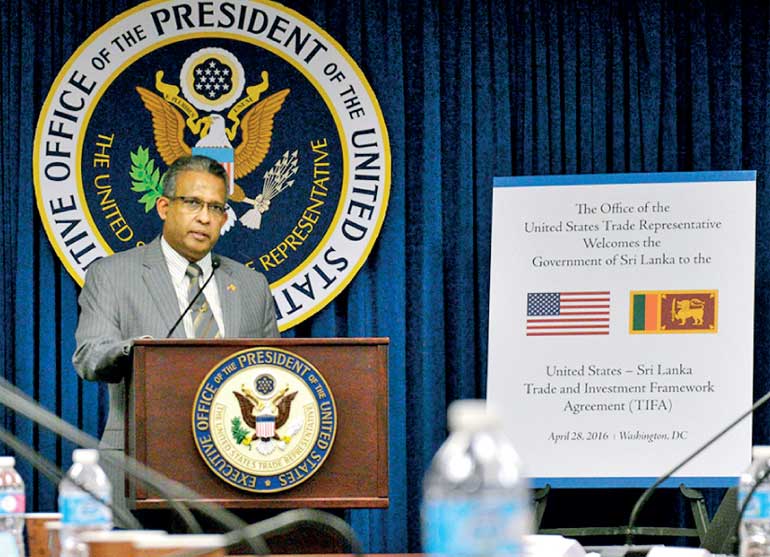Tuesday Feb 24, 2026
Tuesday Feb 24, 2026
Tuesday, 3 May 2016 00:03 - - {{hitsCtrl.values.hits}}
Sri Lanka's Ambassador to the US Prasad Kariyawasam last week said transformation agenda that the Government has undertaken is both ambitious and challenging and the country needs support from international partners such as the United States. “This is where we look to our traditional friends like the United States for assistance in the form of special opportunities for more trade and more investment to kick-start our economy, especially in regions affected by conflict and those afflicted by endemic poverty,” Ambassador Kariyawasam told the 12th Joint Council meeting of the US-Lanka Trade and Investment Framework Agreement. Following are excerpts of his address:
 Ambassador Prasad Kariyawasam speaking at the United States-Sri Lanka Trade and Investment Framework Council meeting
Ambassador Prasad Kariyawasam speaking at the United States-Sri Lanka Trade and Investment Framework Council meeting
Let me first thank Ambassador Froman for his gracious presence. And we are indeed honoured and encouraged by the presence of Ambassador Samantha Power.
Today is in fact a landmark for TIFA process between our two countries, as we have representation at Cabinet-level from US side after long years. And in fact we have two officials of Cabinet rank from your side present, signalling no doubt, United States support for the ongoing transformation in Sri Lanka.
This is also the first meeting of TIFA after the Presidential and Parliamentary Elections in January and in August last year in Sri Lanka, and the formation of the National Unity Government under the leadership of President Maithripala Sirisena and Prime Minister Ranil Wickremesinghe.
In this context, I would like to complement the words of Hon. Minister Samarawickrama, by briefly recalling events and actions in Sri Lanka that underpin the Government’s desire to deepen and broaden the economic content of our relationship with the United States.
At the Presidential Election in January 2015 and the Parliamentary Election in August 2015, the people of Sri Lanka voted for change. They voted for good governance, rule of law, strengthening human rights, freedom of expression and reconciliation. They also voted for an end to divisive politics, and an end to impunity, and in support of the formation of a National Unity Government to ensure policy stability. Sri Lanka has since been making steady progress in all these fronts.
Soon after the Presidential Election in January, Sri Lanka started reaching out to the world. This included the United States of America with whom relations were at a low ebb during the period following the end of the conflict in May 2009.
The progressive policies of the Government including the passage of the 19th Amendment to the Constitution, and its implementation, enabled bilateral relations between Sri Lanka and the US to be revived, based on common values including democracy and respect for the rights of citizens.
Recognizing the need for reconciliation, justice and accountability, and the importance of these steps to achieve a durable peace and long-term economic progress and development, Sri Lanka, manifesting her new approach to human rights, co-sponsored the Resolution on Sri Lanka that was tabled at the 30th Session of the UN Human Rights Council by the United States, last October.
The visit of US Secretary of State John Kerry to Sri Lanka a year ago in May 2015 was yet another landmark in our relations. A US Secretary of State visited Sri Lanka after 43 long years, and it was indeed an honour for the people of Sri Lanka to receive him.
The outcome of the first ever US-Sri Lanka Partnership Dialogue in February this year serves as the platform on which the Partnership between our two countries would be strengthened and built, over time.
The transformation agenda that the Government has undertaken is both ambitious and challenging. The people of our country, like the people of most countries, are impatient as they look for quick results and the receipt of a tangible economic peace dividend. Development and Peacebuilding are intertwined; and the Government needs the continuous and sustained support of the people to carry out economic, political and administrative reforms. The same holds true for the process of reconciliation involving truth, justice, reparations and non-recurrence and the process of drafting and adopting the new Constitution which is central to the process of reconciliation.
Young people seek training and skills required for employment. They seek quality education and jobs that would enable them to live decent lives; children require new and better schools with modern facilities; the old require hospitals and medical care at affordable cost; the displaced require quick resettlement with infrastructure facilities in place; the large number of female headed households require special attention; those affected by conflict require psycho-social and livelihood support. While the Government grapples with all this and more, there are also the adverse effects of climate change that Sri Lanka grapples with – unprecedented heat, drought, unseasonal rains and floods – which adversely affects communities, agriculture and power generation.
The Government is committed to face all these challenges.
However, we cannot achieve success on our own without the assistance of our international partners. This is where we look to our traditional friends like the United States for assistance in the form of special opportunities for more trade and more investment to kick-start our economy, especially in regions affected by conflict and those afflicted by endemic poverty.
We look forward to work together to achieve this goal, in the short, medium and long-term.